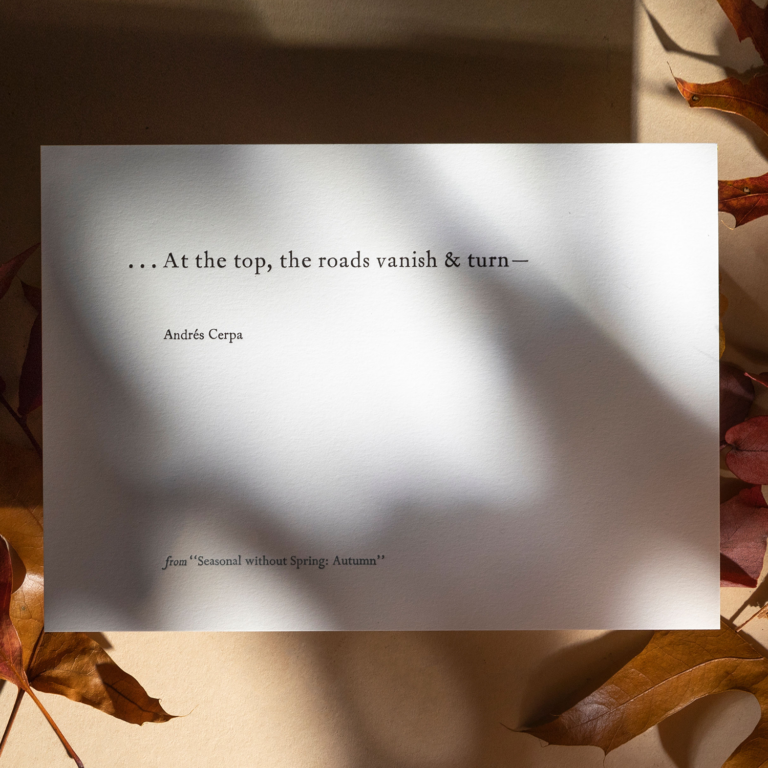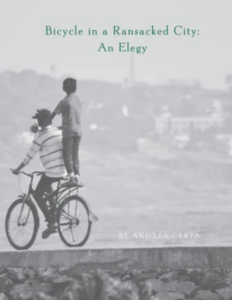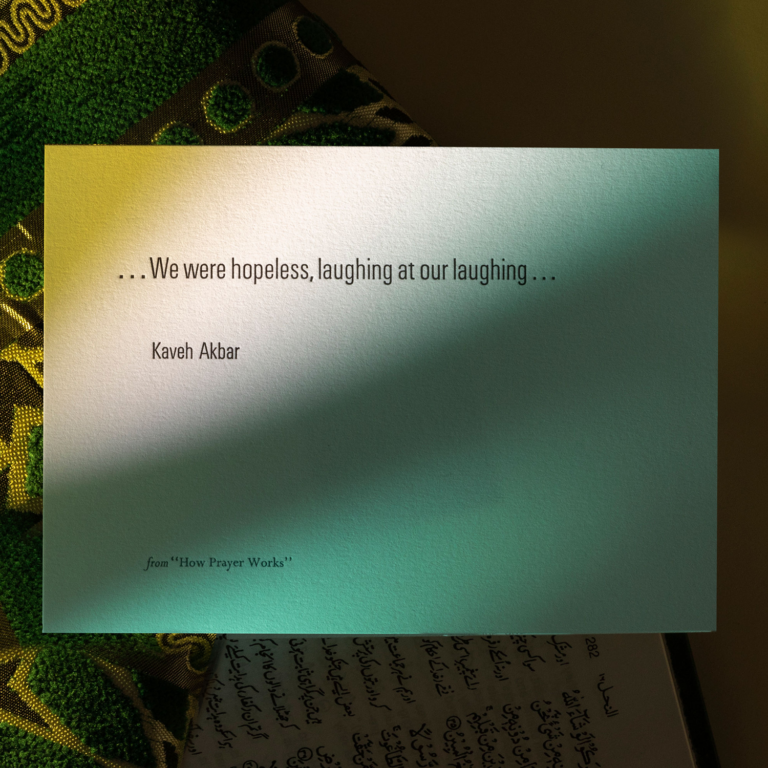Andrés Cerpa
Seasonal without Spring: Autumn
Andrés Cerpa recollects how his father’s early dementia was an increasing influence on his early years. As he grew, his father diminished. The burden of this was heavy on him — he stayed awake listening for information, and fell asleep at school. Older now, he looks at his younger self with tenderness and sadness. This poem gives attention to the experience of the growing presence of absence, and the ways that affects memory, family, and perspective.

Letterpress prints by Myrna Keliher | Photography by Lucero Torres
Guest

Andrés Cerpa is the author of Bicycle in a Ransacked City: An Elegy, and The Vault from Alice James Books. A recipient of fellowships from McDowell and Canto Mundo, his work has appeared in Ploughshares, Poem-a-Day, The Kenyon Review, The Rumpus, Puerto Rico en mi Corazón, The Breakbeat Poets Vol 4: LatiNext, The Nation, and elsewhere. He holds degrees from the University of Delaware and Rutgers University Newark.
Transcript
Pádraig Ó Tuama: My name is Pádraig Ó Tuama, and I have such respect for sad poetry, because there are sad things that happen in our lives, and sadness can be a very difficult thing to face. Perhaps we might reject it or try to change it. But a poem that has arrived at the stage where it can look at sadness and say, yeah, here it is, and perhaps use some beautiful language to describe it, to just let it be — in a certain sense that’s saying, sadness isn’t everything, but it’s in this poem in order for me to be able to acknowledge it, listen to its truth, and speak back to it, too.
[music: “Praise the Rain” by Gautam Srikishan]
“Seasonal without Spring: Autumn” by Andrés Cerpa:
“When I woke for school the next day the sky was uniform & less than infinite
with the confusion of autumn & my father
as he became distant with disease the way a boy falls beneath the ice,
before the men that cannot save him—
the cold like a forever on his lips.
Soon, he was never up before us & we’d jump on the bed,
wake up, wake up,
& my sister’s hair was still in curls then, & my favorite photograph still hung:
my father’s back to us, leading a bicycle uphill.
At the top, the roads vanish & turn—
the leaves leant yellow in a frozen sprint of light, & there, the forward motion.
The nights I laid in the crutch of my parents’ doorway & dreamt awake,
listened like a field of snow,
I heard no answer. Then sleepless slept in my own arms beneath the window
to the teacher’s blank & lull—
Mrs. Belmont’s lesson on Eden that year. Autumn: dusk:
my bicycle beside me in the withered & yet-to-be leaves,
& my eyes closed fast beneath the mystery of migration, the flock’s rippled wake:”
[music: “Bedroll” by Blue Dot Sessions]
This poem of Andrés Cerpa is from a book that spends a lot of time reflecting on his own father’s early diagnosis with Parkinson’s Disease. His father was in his mid-40s when he was diagnosed, and Andrés was only 11. So a lot of the book is about things fading, seeing the back of things, and things being misty and not graspable. You can even hear that in some of the sentences in this poem. They don’t all finish completely. They’re kind of left there, hanging. Things aren’t quite complete.
So the poem is a long meditation on things ending before they should — still being there; it’s not like he’s gone. But it’s not like he’s fully there, either. And in this poem, you hear how Andrés Cerpa had to grow up quickly, and as a result of needing to grow up quickly, he’s had all kinds of questions about what it means to be living. He was a young man — he was a boy, my God. And perhaps he is lamenting, in a certain sense, the lack of things finishing in the way that he would’ve wished they had.
[music: “Jumpup” by Blue Dot Sessions]
This poem starts with “When I woke for school the next day” — the next day after what? He’s 11 in this poem, it seems to me, and maybe it’s the day after his parents told him and his sister about the diagnosis. So much of childhood is about routine — you know, morning routines, and parents awake, and school, maybe a uniform, depending as to what school you’re going for. And in this, what we hear is that they begin to notice that routine changing. Soon, his father is never up before them. And they’re kind of playing: “wake up, wake up.” But perhaps, too, that’s a long echo of something much more serious, which is to say, “Wake up from that thing that’s taking you away from us.”
Why is he waiting by his parents’ bedroom, as a boy? And he’s “like a field of snow.” What a beautiful simile. There’s so much of autumn in this poem, but we hear, somehow, that the boy has moved toward winter in his mind. And how complicated, to be caught up there. The effects of the condition are clear to him. Somehow, he has understood, even though he’s looking for answers — he somehow has an understanding that winter is going to be coming, and with that, silence, and with that, the absence of things.
Toward the end of the poem, when he’s remembering himself in that class — you know, he’s been staying awake at night, trying to listen to his parents talking, hoping that he might get some answers. He’s in the “crutch” of the door, as he calls it. And he isn’t getting any answers, so he’s asleep when Mrs. Belmont is talking about the Garden of Eden. My God, who cares about the Garden of Eden, when everything is falling apart around you? But it’s his own arms, and I wonder whose arms he wishes he was sleeping in.
The poem is almost like a self-comforting now, as an adult, and I find that such a profound wisdom in the poem. It’s that he is perhaps experiencing, and re-experiencing, as an adult, the isolation and the loneliness he felt, even though he wasn’t alone. His mother is there, his sister is there; there’s other people there, too. But he was experiencing something alone. And this poem is a kind of an embrace to his younger self. And that is so wise, so profound. And it’s not nothing. It actually could be everything.
[music: “Every Place We’ve Been” by Gautam Srikishan]
Early on in this poem Andrés Cerpa says of his father, “as he became distant with disease the way a boy falls beneath the ice, / before the men that cannot save him.” So we’re getting these images in the poem, of “distant.” And the father is becoming distant the way a boy might. And that’s a very strange reversal of image. And you see later on where the boy, the 11-year-old, is staying awake at night, trying to find answers, listening to his parents talk. He doesn’t find them. But there’s this role reversal, and he’s growing up so quickly. Lots of us have had to see our parents in a new way, but for him, it’s so particular.
And then there’s even that photograph that was his favorite, you know — his dad is leading a bike uphill, just ahead of whoever took the photo. He’s in front, he knows the way, and there might be roads ahead. And you would imagine that, if you’re following your dad, who’s in front of you, leading a bike uphill and there’s roads ahead, that you’d trust that your dad would know which way to go. But in this poem, we’re hearing that that’s not going to be the case — that he will be the one to lead his father on. And even though that photograph was his favorite, it doesn’t seem like he has that anymore. That’s gone, too.
So there’s fading happening — not dying, but fading, and watching something fade. I know so many people who will hear this poem and go, oh, yeah, me too. That long ache — it’s not necessarily that they’re saying they wished it was different or that they wished that illness came in a different way, but they’re finding themselves with a strange kind of a living grief. And they’ll remember the feeling of that in the body, and the anticipation about time that happens when you’re in those circumstances, because when you know that there is an inevitable decline that’s happening, that automatically attunes you, in a certain sense, towards time.
[music: “Invicta” by Blue Dot Sessions]
What is it about bicycles in this poem? A bike is a direction of travel. It’s something you can carry with you. It’s simple; it’s been around for a long time; it’s expected. It’s also a rite of passage, being taught to ride a bike by whoever it is that teaches you; someone in the family, or a neighbor, or wherever you’ve learned to ride a bike. And perhaps the usage of a bike here is a certain form of love and remembrance and bicycle trips. And suddenly, these bicycle trips are going to be alone, and maybe they’re going through ransacked cities of somebody’s mind, where he’s the one who is able to ride the bike through landscape that somebody used to know but doesn’t know anymore.
[music: “Invicta” by Blue Dot Sessions]
This poem ends in such an unusual way. The last lines of the poem are “& my eyes closed fast beneath the mystery of migration, the flock’s rippled wake:” — and then there’s a colon, two points, rather than a period. It’s so interesting to introduce migration and a flock of birds in the final line of the poem, when there’s no reference to birds anywhere throughout it. There is reference to season, though, so there’s an imagination of birds leaving, but with the expectation that they’ll come back. And that, I think, is part of the sadness of this poem, is that he knows that what is leaving in front of him is not going to be coming back.
That last word, “wake,” you can think of so many cultures across the world who have a wake after somebody’s died, as well. And that, too, I think is an anticipation of the future — that what the future will hold will be a wake.
This poem ends with a colon. And why would you do that, indicating something’s to come after, but it’s blank? Maybe he’s imagining what could have been, for his father, had not this diagnosis come. Or he’s imagining for himself, or he’s saying that when you’re 11 and you’re trying to figure all this out, that your own future seems like a blank in front of you. I don’t know, but it’s an amazing way of using unexpected punctuation to leave you hanging a little bit, to leave you anticipating, to leave you yearning for something that isn’t there. In that colon, those two tiny little points of ink on the page, we, too, are brought into the fact that this experience, for him, as a child, didn’t have a proper ending. And his telling of the story of his father, too, doesn’t have an ending that they would have desired.
[music: “Levander Crest” by Blue Dot Sessions]
There’s a famous Irish fiddle player, Martin Hayes, who speaks about melancholy in Irish music. And he says that melancholy isn’t something to be avoided; that, actually, both melancholy and happiness can lead us into a certain sweet kind of reflection. And the melancholy in this poem is so powerful. So many of the poems in Andrés Cerpa’s book describe how he tried to escape from himself over the ensuing years, as his father continued fading and he felt, himself, like he was lost of something. Andrés Cerpa’s father did die, years after this poem is set. He died in 2017. And what’s beautiful, I think, in the attention he gives to the sadness of this experience is that he is now old enough to be able to say, yeah, it was sad. He couldn’t fight against it. He couldn’t stop it. He couldn’t get answers. He can just look, with melancholy and sadness.
And that is a deep wisdom, and actually, in a strange way, it’s a profound kind of good news, to say that there will come a day when you can be sad for the things that you should be sad about, rather than ripped apart from yourself, not even present to yourself. And that, I think, is a deep wisdom at the heart of this poem that invites all of us to think, if the sadness is too much for now, well, then, a state of healing in the future will be when I’ll be able to look at this and recognize the sadness that’s right about the moment.
[music: “Memoriam” by Gautam Srikishan]
“Seasonal without Spring: Autumn” by Andrés Cerpa:
“When I woke for school the next day the sky was uniform & less than infinite
with the confusion of autumn & my father
as he became distant with disease the way a boy falls beneath the ice,
before the men that cannot save him—
the cold like a forever on his lips.
Soon, he was never up before us & we’d jump on the bed,
wake up, wake up,
& my sister’s hair was still in curls then, & my favorite photograph still hung:
my father’s back to us, leading a bicycle uphill.
At the top, the roads vanish & turn—
the leaves leant yellow in a frozen sprint of light, & there, the forward motion.
The nights I laid in the crutch of my parents’ doorway & dreamt awake,
listened like a field of snow,
I heard no answer. Then sleepless slept in my own arms beneath the window
to the teacher’s blank & lull—
Mrs. Belmont’s lesson on Eden that year. Autumn: dusk:
my bicycle beside me in the withered & yet-to-be leaves,
& my eyes closed fast beneath the mystery of migration, the flock’s rippled wake:”
[music: “Praise the Rain” by Gautam Srikishan]
Chris Heagle: “Seasonal without Spring: Autumn” comes from Andrés Cerpa’s book Bicycle in a Ransacked City: An Elegy. Thank you to The Permissions Company on behalf of Alice James Books, who gave us permission to use Andrés’s poem. Read it on our website, at onbeing.org.
[music: “Praise the Rain” by Gautam Srikishan]
Poetry Unbound is: Gautam Srikishan, Erin Colasacco, Eddie Gonzalez, Lilian Vo, and me, Chris Heagle.
Our music is composed and provided by Gautam Srikishan and Blue Dot Sessions.
This podcast is produced by On Being Studios, which is located on Dakota land. We also produce other podcasts you might enjoy, like On Being with Krista Tippett, Becoming Wise, and This Movie Changed Me. Find those wherever you like to listen, or visit us at onbeing.org to find out more.
Books & Music
Recommended Reading
The On Being Project is an affiliate partner of Bookshop.org and Amazon.com. Any earnings we receive through these affiliate partnerships go into directly supporting The On Being Project.









Reflections